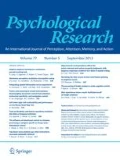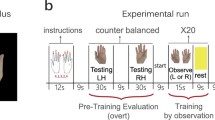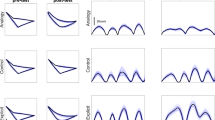Abstract
In two experiments, subjects learned action phrases in verbal and subject-performed tasks. They had to recognize these action phrases among foils that denoted either completely different actions, conceptually similar actions, or actions that were conceptually and motorically similar. It was found that recognition performance was impaired equally after both kinds of learning when conceptually similar distractors were used, but was impaired more after subject-performed-task learning when the distractors were both conceptually and motorically similar. The possible contribution of motor information in this interaction is discussed.
Similar content being viewed by others
References
Bahrick, H. P., & Boucher, B. (1968). Retention of visual and verbal codes of the same stimuli. Journal of Experimental Psychology, 78, 417–422.
Cohen, R. L. (1981). On the generality of some memory laws. Scandinavian Journal of Psychology, 22, 267–281.
Cohen, R. L. (1983). The effect of encoding variables on the free recall of words and action events. Memory & Cognition, 11, 575–582.
Cohen, R. L. (1989). Memory for action events: The power of enactment. Educational Psychology Review, 1, 57–80.
Cohen, R. L., Peterson, M., & Mantini-Atkinson, T. (1987). Interevent differences in event memory: Why are some events more recallable than others? Memory & Cognition, 15, 109–118.
Dick, M. B., Kean, M. L., & Sands, D. (1989). Memory for action events in Alzheimer-type dementia: Further evidence of an encoding failure. Brain and Cognition, 9, 71–87.
Engelkamp, J., & Krumnacker, H. (1980). Imaginale und motorische Prozesse beim Behalten verbalen Materials. Zeitschrift für experimentelle und angewandte Psychologie, 27, 511–533.
Engelkamp, J., & Zimmer, H. D. (1983). Der Einfluß von Wahrnehmen und Tun auf das Behalten von Verb-Objekt-Phrasen. Sprache und Kognition, 2, 117–127.
Engelkamp, J., & Zimmer, H. D. (1989). Memory for action events: A new field of research. Psychological Research, 51, 153–157.
Engelkamp, J., Zimmer, H. D., & Biegelmann, U. E. (1993). Bizarreness in verbal tasks and in subject-performed tasks. European Journal of Cognitive Psychology, 5, 393–415.
Engelkamp, J., Zimmer, H. D., & Mohr, G. (1990). Differential memory effects of concrete nouns and action verbs. Zeitschrift für Psychologie, 198, 189–216.
Goldstein, A. G., & Chance, J. E. (1970). Visual recognition memory for complex configurations. Perception & Psychophysics, 9, 237–241.
Helstrup, T. (1989). Loci for act recall: Contextual influence on processing of action events. Psychological Research, 51, 168–175.
Homa, D., & Viera, C. (1988). Long-term memory for pictures under conditions of thematically related foils. Memory & Cognition, 16, 411–421.
Knopf, M. (1991). Having shaved a kiwi fruit: Memory of unfamiliar subject-performed actions. Psychological Research, 53, 203–211.
Mohr, G., Engelkamp, J., & Zimmer, H. D. (1989). Recall and recognition of self-performed acts. Psychological Research, 51, 181–187.
Nelson, T. O., Metzler, J., & Reed, D. A. (1974). Role of details in the long-term recognition of pictures and verbal descriptions. Journal of Experimental Psychology, 102,184–1866.
Nelson, D. L., Reed, V S., & Walling, J. R. (1976). Pictorial superiority effect. Journal of Experimental Psychology: Human Learning and Memory, 2, 523–528.
Nilsson, L. G., & Bäckman, L. (1991). Encoding dimensions of subject-performed tasks. Psychological Research, 53, 212–218.
Saltz, E., & Donnenwerth-Nolan, S. (1981). Does motoric imagery facilitate memory for sentences? A selective interference test. Journal of Verbal Learning and Verbal Behavior, 20, 322–332.
Shepard, R. N. (1967). Recognition memory for words, sentences and pictures. Journal of Verbal Learning and Verbal Behavior, 6, 156–163.
Shepard, R. N., & Chang, J. J. (1963). Forced-choice tests of recognition memory under steady-state conditions. Journal of Verbal Learning and Verbal Behavior, 2, 93–101.
Wiseman, S., & Neisser, U. (1974). Perceptual organization as a determinant of visual recognition memory. American Journal of Psychology, 87, 675–681.
Zimmer, H. D. (1991). Memory after motoric encoding in a generation-recognition model. Psychological Research, 53, 226–231.
Zimmer, H. D., & Engelkamp, J. (1984). Planungs- und Ausführungsanteile motorischer Gedächtniskomponenten und ihre Wirkung auf das Behalten ihrer verbalen Bezeichnungen. Zeitschrift für Psychologie, 192 379–402.
Zimmer, H. D., & Engelkamp, J. (1985). An attempt to distinguish between kinematic and motor memory components. Acta Psychologica, 58, 81–106.
Zimmer, H. D., & Engelkamp, J. (1989a). Does motor encoding enhance relational information? Psychological Research, 51, 158–167.
Zimmer, H. D., & Engelkamp, J. (1989b). One, two or three memories: Some comments and new findings. Acta Psychologica, 70, 293–304.
Author information
Authors and Affiliations
Rights and permissions
About this article
Cite this article
Engelkamp, J., Zimmer, H.D. Motor similarity in subject-performed tasks. Psychol. Res 57, 47–53 (1994). https://doi.org/10.1007/BF00452995
Received:
Accepted:
Issue Date:
DOI: https://doi.org/10.1007/BF00452995




